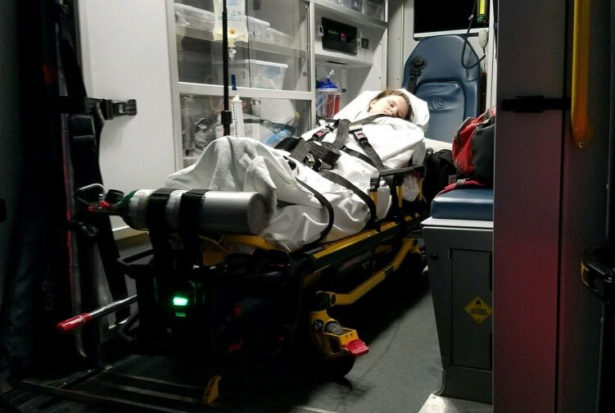
Our secret shopper bought Jasper (pictured above) at a Florence, Kentucky, Petland store. The manager falsely told our secret shopper that he was perfectly healthy and had been tested for campylobacter. We immediately took Jasper to an independent veterinarian who diagnosed him with campylobacter, giardia and other ailments. Photo by the HSUS
U.S. health authorities have conclusively linked numerous human cases of campylobacteriosis—a bacterial infection with often severe and debilitating symptoms—to infected puppies sold in several Petland pet stores. Today we filed a petition with the Consumer Product Safety Commission asking it to require that pet stores selling dogs post signs warning consumers about the potential health risk they could face from handling or purchasing puppies at these stores.
The Centers for Disease Control has already been investigating two multi-drug-resistant campylobacter outbreaks at Petland pet stores and has recommended that Petland and other pet industry players implement reforms to decrease the risk of puppies getting sick with the bacteria and transmitting it to people. We have heard from consumers who had to be hospitalized after contracting campylobacter from an infected puppy they bought at Petland and two of our own investigators contracted the bacteria while working undercover at Petland. The industry has largely declined to act on the recommendations, however, keeping consumers in the dark about the campylobacter risk, which could be particularly dangerous for those who are immuno-compromised.
Our eight undercover investigations of Petland stores unearthed more evidence of the national puppy-selling pet store chain’s refusal to act to prevent more outbreaks or improve the level of veterinary care at their stores, despite the campylobacter outbreaks traced to their stores. Our investigators found that:
- Instead of providing noticeably ill puppies with professional veterinary care, Petland managers often had staff with no apparent veterinary training “treat” the puppies, without the benefit of any diagnosis.
- Petland staff were captured on camera explaining that antibiotics are given to puppies who are not sick, which is the very behavior that leads to the more dangerous antibiotic-resistant bacterial strains.
- Petland did not routinely test sick puppies for campylobacter or other parasites or diseases, even after the CDC traced an outbreak to Petland dogs. A store manager told our undercover investigator that the store does not routinely test dogs for campylobacter because she claimed that most of them would test positive for it.
- At a Florence, Kentucky, Petland store, the manager falsely told our secret shopper that a goldendoodle—who had been suffering for weeks with diarrhea and lethargy—was perfectly healthy and had been tested for campylobacter. Immediately after purchasing Jasper, our secret shopper took him to an independent veterinarian who diagnosed him with campylobacter, giardia and other ailments.

Above, Katie Singleton, a teenager who worked at the Mall of Georgia Petland and became seriously ill after being exposed to a puppy harboring campylobacter, according to news reports. She was rushed to the hospital with a fever near 105.
This is unacceptable: the Consumer Product Safety Commission is the federal agency charged with protecting the public from risks of injury or death associated with consumer products, and it must do its job and ensure pet stores are warning consumers about the risks associated with handling or purchasing pet store puppies.
Dogs are not industrial products but sentient companion animals. Unfortunately, pet stores and the puppy mills they often source from consider them products and treat them like inanimate, profit-making objects. Breeding dogs and their litters are locked up in small cages in unsanitary, overcrowded conditions, with little opportunity for exercise or play. The dogs churn out as many puppies as possible until they are no longer able to do so.
Not surprisingly, diseases thrive under such conditions. Puppies born in these facilities are frequently sick with contagious or congenital illnesses, are loaded with strong antibiotics as a shortcut for proper sanitation and health care and then are transported to pet stores across the country in crowded trucks where they can transmit disease to other puppies. The blanket use of strong drugs, whether the puppies need it or not, is believed to be linked to drug-resistant strains of disease, like the one the CDC has studied.
Once they arrive at pet stores, puppies are frequently denied proper veterinary care, and often plied with even more antibiotics to mask their symptoms despite not having a veterinary diagnosis.
It is clear by now that we cannot expect pet stores to act proactively to reduce the disease risk, so we need our federal government to use its power to ensure these stores are not endangering consumers and the animals in their care. Once warning signs are posted, consumers can decide for themselves whether they want to handle a puppy who may or may not be infected. We urge the CPSC to step in swiftly and decisively to require pet stores to post campylobacter warnings. No one wants a trip to a pet store to turn into a trip to the doctor or hospital and no one should be kept in the dark about a known health risk that could endanger their life.
Sara Amundson is president of the Humane Society Legislative Fund.
The post Puppy-selling pet stores like Petland have made consumers sick. HSUS/HSLF petition asks feds to require health risk warnings at outlets. appeared first on A Humane World.
Enviroshop is maintained by dedicated NetSys Interactive Inc. owners & employees who generously contribute their time to maintenance & editing, web design, custom programming, & website hosting for Enviroshop.
